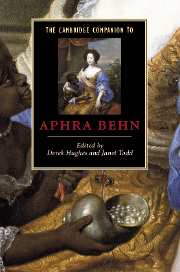Book contents
- Frontmatter
- 1 Aphra Behn: The Documentary Record
- 2 Behn, women, and society
- 3 Aphra Behn and the Restoration theatre
- 4 The political poetry of Aphra Behn
- 5 Behn’s dramatic response to Restoration politics
- 6 Tragedy and tragicomedy
- 7 Behn and the unstable traditions of social comedy
- 8 The Cavalier myth in The Rover
- 9 ‘The story of the heart’: Love-letters between a Noble-Man and his Sister
- 10 Oroonoko: reception, ideology, and narrative strategy
- 11 ‘Others’, slaves, and colonists in Oroonoko
- 12 The short fiction (excluding Oroonoko)
- 13 Pastoral and lyric: Astrea in Arcadia
- 14 Aphra Behn’s French translations
- Further reading
- Index
- Series list
1 - Aphra Behn: The Documentary Record
Published online by Cambridge University Press: 28 May 2006
- Frontmatter
- 1 Aphra Behn: The Documentary Record
- 2 Behn, women, and society
- 3 Aphra Behn and the Restoration theatre
- 4 The political poetry of Aphra Behn
- 5 Behn’s dramatic response to Restoration politics
- 6 Tragedy and tragicomedy
- 7 Behn and the unstable traditions of social comedy
- 8 The Cavalier myth in The Rover
- 9 ‘The story of the heart’: Love-letters between a Noble-Man and his Sister
- 10 Oroonoko: reception, ideology, and narrative strategy
- 11 ‘Others’, slaves, and colonists in Oroonoko
- 12 The short fiction (excluding Oroonoko)
- 13 Pastoral and lyric: Astrea in Arcadia
- 14 Aphra Behn’s French translations
- Further reading
- Index
- Series list
Summary
When Aphra Behn first attracted public literary notice, it was in September 1670 with her first play, The Forc'd Marriage, which she published in 1671 with the epigraph, 'Va mon enfant! Prend ta fortune.' Since the Duke's Company presented this as the opening play of their new season and Thomas Otway acted in it, we can assume that Behn's literary connections were formed before the staging of her first play. But tracing the convoluted path of Aphra Behn to this theatrical première is not simple.
Behn is a particularly hard person to pin down. Germaine Greer calls her 'a palimpsest; she has scratched herself out', somehow avoiding notice in church or tax records, perhaps deliberately. Janet Todd underpins this when she notes that Behn 'has a lethal combination of obscurity, secrecy and staginess, which makes her an uneasy fit for any narrative, speculative or factual. She is not so much a woman to be unmasked as an unending combination of masks.'
The closest we come to establishing a time and place for Behn’s birth is in Harbledown, Kent, 14 December 1640, as Eaffrey Johnson, daughter of Elizabeth Denham and Bartholomew Johnson. The name Johnson and the Kentish birthplace were noted in 1696 in the brief biographies published first in The Younger Brother and shortly thereafter in Histories and Novels. In these two documents, we have the skeleton of the biography: the voyage to Surinam, the marriage to Mr Behn, and the ‘several Negotiations in Flanders’ for Charles II.
- Type
- Chapter
- Information
- The Cambridge Companion to Aphra Behn , pp. 1 - 11Publisher: Cambridge University PressPrint publication year: 2004
- 5
- Cited by



